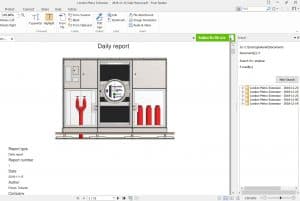5 most important items to include in your site daily reports
Last time we published the article about the importance of daily record keeping on your construction site. You can read there why it is crucial to maintain daily records where you are a GRC cladding contractor or prefabricated garden office supplier. Today, we want to identify 5 most important items that you should write about in your daily reports.
-
Date of your daily reports
Having a date in each report is the most important of all items. After all, dates are also the most important part of the project contract. They define start of the project, access dates, key dates, deadlines, completion dates and many other scheduled events. That is why they need to be in your report. If you want to record what happened or what didn’t happen on particular day, you need to put a date in your report. It will be referenced against other dates. Let’s say that MEP contractor did not finish their job on time. As a result, your customer gave you access to your working area 7 days later than agreed in the contract. You need to record that date for when you actually started with your work in that working area.
-
Daily Reports number
This part should be fairly easy, every daily report or log should have its own unique number. When you run a project for half a year, or even longer, you will produce a lot of daily reports. Proper numbering will ease the way you look for a specific one. Also, it is much easier to refer to that specific report number. When you tell you customer that you already reported about the blocked access to the Turbine Hall, you don’t need to tell him to look for the information himself. You can be very specific by providing the exact report number.
I assume you know how many people and which professions from your organisation or from your subcontractors you have on site. But not everyone involved on the project knows it. Adding these pieces of information makes your reports more valuable. Your customer can see how many persons and which trades you have on site. On one hand, this can give the customer good feeling by him knowing that you provide sufficient skills and correct amount of workforce to complete the job on time. On the other hand, it may give your customer another reason for argument. They might say that you do not provide sufficient numbers of people to finish the job on time.
However, if you manage your project and construction site properly you will be able to explain to the customer that adding more workers not always adds more productivity. Nevertheless, keeping this information in the reports may help you in the future when you analyse the project. If you can track down how many men you have on site and link it to progress and issues, you might be able to come to new conclusions about your project management.
-
Progress updates in daily reports
Recording progress is the essence of daily reports. It is also a good practice as it keeps everyone from the distribution list in the loop. Everyone can easily know the current situation of your work package. Concrete slab pouring finished in 30%, scaffolding for installation of steel structure completed in 80% – these are just short examples of how the progress can be reported. Of course you can use different metrics and instead of percentage use number of pieces, tonnage, cubic meters, square foot or any other unit relevant to your scope of work. By adding pictures from the actual tasks you only strengthen the description and numbers behind it.
Some site managers have this urge to add a bit more percentage to the progress report than it actually is on site. I would advise against this procedure. It may seem harmless to add a few more points here and there, but at some time your report would not reflect real situation of the project. This may be misleading for Quantity Surveyors, Commercial departments or even for workers on site. Due to this practice QS’s will not be able to assess the contract entitlement properly and site labour may not put so much effort if they believe more work was done.
Tracking progress is difficult, however, with proper care and detailed attention to the bill of quantities the task gets easier.
-
Issues and hindrances at your construction site
Not many projects run without any issues or obstructions. Construction sites are not laboratories. Even though we try to schedule tasks with the highest accuracy we still have to face the unexpected on daily basis.
That is why you should keep a record of every item that stops you from carrying out your contractual work. Some of the most common issues here will be: lack of access to the working area, no release for the work, delays of other contractors delaying your start/completion. The more details you add here the better it will explain why your organisation was not able to perform as agreed per contract.
Similarly to the progress part of the report, you should add pictures here as well. Photographic evidence of issues not only proves what you wrote it but also speaks louder than words. If your description is not understandable, your pictures should clear out any doubt in this section.
The above mentioned list is not standard per any project or any specific construction industry. You might want to add information about deliveries, weather, snags or HSEQ issues as well. These will definitely give much broader and better insight into your project situation. Your organisation may have its own template for site reports which would include additional pieces of information.
Which tool to use to include all the above in your site reports?
There are several great construction management apps available and some of them can help you in making daily reports. For example iNeoSyte – construction management app helps you in making daily reports in a fast and easy way. You can generate professional PDF reports and share them with others. You can also store them in the cloud. Another advantage of having PDF reports created from iNeoSyte is that you can search through multiple reports either in PDF form or online through the database.
Which other items in your opinion are essential for daily reports?





6 Comments
Other point is the equipment, because is essential for evaluate the forecasting of progress by next time.
Safety #1
Weather is critical. As noted
Subcontractor review.
Status of long lead items.
I think incidents should be included so that improved processes can be implemented and also to prevent similar occurences in the future. Safety should always be first and foremost.